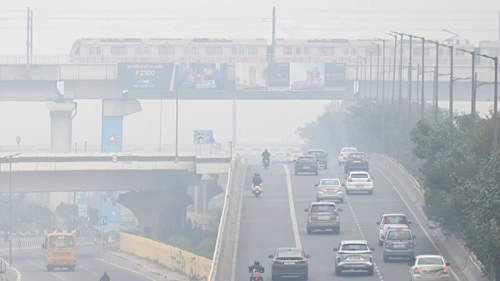As air quality deteriorates in the National Capital Region (NCR), authorities have implemented Stage III of the Graded Response Action Plan (GRAP) to mitigate pollution. The Air Quality Index (AQI) in Delhi has reached alarming levels, prompting immediate action to protect public health.
Air Quality Status

Recent data indicates that Delhi’s AQI has entered the ‘Severe’ category, with particulate matter (PM2.5 and PM10) concentrations exceeding safe limits. This escalation is attributed to factors such as vehicular emissions, industrial activities, and adverse meteorological conditions that trap pollutants close to the ground.
GRAP Stage III Measures
In response to the worsening air quality, the Commission for Air Quality Management (CAQM) has activated Stage III of GRAP, which includes:
- Ban on BS-III Petrol and BS-IV Diesel Vehicles: The operation of BS-III petrol and BS-IV diesel four-wheelers is prohibited in Delhi-NCR, except for essential and emergency services. This measure aims to reduce vehicular emissions, a significant contributor to urban air pollution.
- Suspension of Non-Essential Construction Activities: All non-essential construction and demolition work is halted to prevent dust and particulate matter from further degrading air quality.
- Closure of Brick Kilns and Hot Mix Plants: Operations of brick kilns, hot mix plants, and stone crushers not operating on clean fuels are suspended.
- Enhanced Public Transport: Authorities are increasing the frequency of public transport services to discourage the use of private vehicles.
Public Advisory
Residents are advised to:
- Limit Outdoor Activities: Stay indoors, especially during early morning and late evening hours when pollution levels peak.
- Use Masks: Wear N95 masks when outdoors to reduce inhalation of harmful pollutants.
- Avoid Strenuous Activities: Refrain from outdoor exercises and activities that increase respiratory rate.
Health Implications
Exposure to high pollution levels can lead to respiratory issues, cardiovascular problems, and aggravate existing health conditions. Vulnerable groups, including children, the elderly, and individuals with pre-existing health conditions, are particularly at risk.
Government Initiatives
The Delhi government has been proactive in combating air pollution through measures such as:
- Promotion of Electric Vehicles (EVs): Incentives are provided to encourage the adoption of EVs, reducing dependence on fossil fuels.
- Green War Rooms: Monitoring centers have been established to track pollution levels and coordinate response strategies.
- Public Awareness Campaigns: Efforts are underway to educate citizens about pollution sources and preventive measures.
Challenges Ahead
Despite these efforts, challenges persist, including:
- Stubble Burning: Agricultural residue burning in neighboring states contributes significantly to Delhi’s pollution levels during winter months.
- Industrial Emissions: Unregulated industrial activities continue to emit pollutants into the atmosphere.
- Vehicular Emissions: The high number of vehicles on the road exacerbates air quality issues.
Conclusion
The enforcement of GRAP Stage III measures reflects the urgent need to address Delhi-NCR’s escalating air pollution crisis. While these interventions are necessary, long-term solutions require sustained efforts, policy reforms, and active public participation to ensure cleaner air and a healthier environment for all residents.
For more detailed information and updates, residents are encouraged to follow official communications from the Delhi government and the Commission for Air Quality Management.
Hina Abbasi is Editor and a passionate sports and entertainment content writer at WinnersMaze.com. Hina’s expertise spans across a wide range of sports, and interest in many TV shows allowing her to deliver insightful analysis and compelling stories that resonate with readers.

